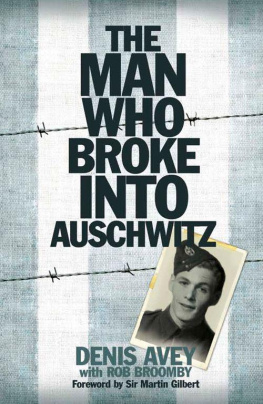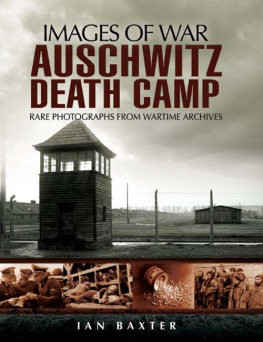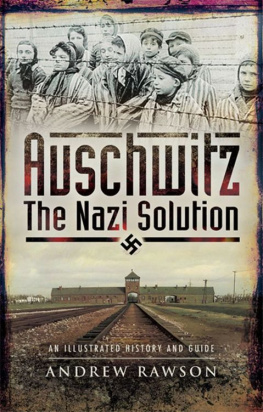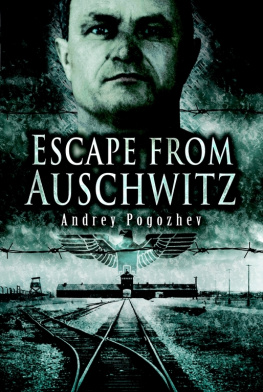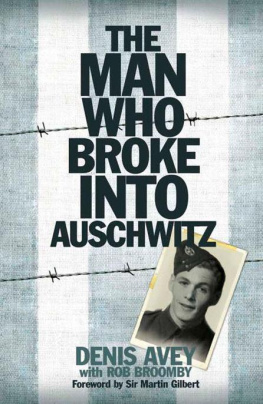THE MAN WHO BROKE INTO AUSCHWITZ
DENIS AVEY
with ROB BROOMBY

www.hodder.co.uk
First published in Great Britain in 2011 by Hodder & Stoughton
An Hachette UK company
Copyright Denis Avey 2011
Foreword Copyright Martin Gilbert 2011
The right of Denis Avey to be identified as the Author of the Work has been asserted by him in accordance with the Copyright, Designs and Patents Act 1988.
All rights reserved. No part of this publication may be reproduced, stored in a retrieval system, or transmitted, in any form or by any means without the prior written permission of the publisher, nor be otherwise circulated in any form of binding or cover other than that in which it is published and without a similar condition being imposed on the subsequent purchaser.
A CIP catalogue record for this title is available from the British Library
ISBN 978 1 444 71416 6
Epub ISBN 978 1 444 71418 0
Hodder & Stoughton policy is to use papers that are natural, renewable and recyclable products and made from wood grown in sustainable forests. The logging and manufacturing processes are expected to conform to the environmental regulations of the country of origin.
Hodder & Stoughton Ltd
338 Euston Road
London NW1 3BH
www.hodder.co.uk
To the memory of Ernie Lobet,
and a man I know only as Hans.
CONTENTS
Foreword
This is a most important book, and a timely reminder of the dangers that face any society once intolerance and racism take hold. Denis Avey, who is now ninety-three, wants his book to be a reminder that Fascism and genocide have not disappeared as he has said, It could happen here. It could indeed happen anywhere where the veneer of civilization is allowed to wear off, or is torn off by ill will and destructive urges.
It is good that Denis Avey now feels able to tell his story. Many of those who went through the traumas of the war years, including Jewish survivors of the Holocaust, found, as he did, that in 1945 no one wanted to listen. Sixty-five years later, a British prime minister, Gordon Brown, welcomed him to 10 Downing Street to hear his story, to commend his courage, and to give him a medal inscribed In Service of Humanity.
It takes courage to be a witness. To this day, Denis Avey recalls with horror, among so many other horrors, a Jewish boy standing to attention, drenched in blood, being beaten around the head. This book should be read by all those who want an eyewitness account of the nightmare that was the slave labour camp at Buna-Monowitz, just outside Auschwitz, where the Jewish prisoners in particular were subjected to the harshest of treatments, and killed once they were too weak to work for their SS taskmasters.
Denis Aveys experiences of the Nazi treatment of the Jews are disturbing as they should be, for the human mind finds it hard to enter into a world dominated by cruelty, and where a small gesture like that of Denis Avey towards a Dutch Jewish prisoner is a rare shaft of light and comfort. He also tells us of his time before being made a prisoner of war: fighting in the Western Desert. Here too he tells a powerful tale without flinching from the horrors, and the death of his friend Les, blasted to kingdom come next to him. Les was the chap with twinkling eyes. I had come all the way from Liverpool with him, I had danced with his sister Marjorie, sat round the kitchen table with his folks, laughed at their jokes and shared their food. And now his first reaction, on finding half of poor old Les all over me, was Thank God it wasnt me. That reaction still troubles him today.
The honesty of this book heightens its impact. The description of Buna-Monowitz is stark, and true. By swapping his British army uniform with a Jewish prisoners striped rags and going into the Jewish section of that vast slave labour camp zone, he became a witness. I had to see for myself what was going on, he writes. Our knowledge of one of the worst corners of the SS kingdom is enhanced because he did so. This book is a tribute both to Denis Avey, and to those whose story he was determined to tell at the risk of his life.
Sir Martin Gilbert
8 February 2011
Prologue
22 January 2010
A microphone was thrust in front of me as I climbed out of the taxi by the fortified gates of Downing Street. What could I tell them? I was there because of something I did in the war not my fighting in the Western Desert, not my being captured by the Germans, but because of what happened in Auschwitz.
Back in 1945 no one had wanted to listen, so I stopped talking about it for the best part of sixty years. My first wife saw the worst of it. I would wake up covered in sweat with the sheets soaked, haunted by the same dream. I can still see that poor lad now, standing to attention, drenched in blood and being beaten around the head. I relive it every day, even now, nearly seventy years later. When I met my second wife Audrey she knew something was wrong and she knew it was to do with Auschwitz, but still I couldnt speak to her about it for decades. These days I cant stop going over it and she thinks Im trapped in the past, that I should move on, look forward. Thats not easy at my age.
The polished door of 10 Downing Street that I had seen so often on the news framing the countrys leaders opened and I stepped inside. In the hallway they took my coat and ushered me up the stairs, past the framed portraits of former prime ministers. At one point I faced a photograph of Churchill himself, and thought to myself that it was a surprisingly small picture for such a giant of a leader. I paused for breath, leaning on my metal walking stick, before going on past the post-war premiers with Thatcher, Major and Blair towards the top.
I flopped into a chair I was ninety-one and I needed time to recover from the climb. I looked around in awe at the grandeur of the Terracotta Room with its high ceilings and chandeliers. I knew that prime minister Gordon Brown had announced that morning that he would give evidence before the Chilcot inquiry into the Iraq war and with the general election coming I wondered whether he would have time to meet me.
The mood changed in a flash. The prime minister came into the room, headed straight for me and took my hand. He spoke very softly, almost in a whisper. The room was now full of people but it still felt like an intensely private moment. Were very, very proud of you. Its a privilege for us to have you here, he said. I was touched.
His wife Sarah introduced herself to me. I didnt know what to do so I kissed her hand and said she was more beautiful than on the television. She was, but I still shouldnt have said so. It was the kind of indiscretion that, luckily, a ninety-one-year-old can get away with. I quickly moved to safer ground by adding, I liked the speech you made the other day. She smiled and thanked me.
The press photographers and TV crews wanted their shots of the two of us together. I thought the prime minister was having a rough time politically and I told him I didnt like the way his colleagues were stabbing him in the back, and that if he needed a minder I was ready. He smiled and said hed bear it in mind. I wouldnt do your job for a gold clock, I said. I may not have voted for him, but he was a decent man and I was impressed by his sincerity.
Gordon Browns attention was intense and undivided and for a while it felt as if it excluded all the other people in the room. I have a glass eye another legacy of Auschwitz and I struggled to focus on him with my good one. Mr Brown is also partially sighted and we sat so close together as we talked, our foreheads were almost touching.

